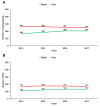Radial Approach Expertise and Clinical Outcomes of Percutanous Coronary Interventions Performed Using Femoral Approach
- PMID: 31540442
- PMCID: PMC6780122
- DOI: 10.3390/jcm8091484
Radial Approach Expertise and Clinical Outcomes of Percutanous Coronary Interventions Performed Using Femoral Approach
Abstract
We sought to evaluate the impact of experience and proficiency with radial approach (RA) on clinical outcomes of percutaneous coronary interventions (PCI) performed via femoral approach (FA) in the "real-world" national registry. A total of 539 invasive cardiologists performing PCIs in 151 invasive cardiology centers in Poland between 2014 and 2017 were included. Proficiency threshold was set at >300 PCIs during four consecutive years per individual operator. The majority of operators performed >75% of all PCIs via RA (449 (65.4%)), 143 (20.8%) in 50-75% of cases, 62 (9.0%) in 25-50% and only 33 (4.8%) invasive cardiologists were using RA in <25% of all PCIs. Operators with the highest proficiency in RA were associated with increased risk of periprocedural death, stroke and bleeding complications at access site during angiography via FA. Similarly, higher prevalence of periprocedural mortality during PCI with FA was observed in most experienced radial operators as compared to other groups. The detrimental effect of FA utilization by the most experienced radial operators was observed in both stable angina and acute coronary syndromes. Higher experience and utilization of RA might be linked to worse outcomes of PCIs performed via femoral artery in both stable and acute settings.
Keywords: all-comers; experience; femoral; radial; registry.
Conflict of interest statement
The authors declare no conflict of interest.
Figures
References
-
- Bernat I., Horak D., Stasek J., Mates M., Pesek J., Ostadal P., Hrabos V., Dusek J., Koza J., Sembera Z., et al. ST elevation myocardial infarction treated by radial or femoral approach in a multicenter randomized clinical trial: The STEMI-RADIAL Trial. J. Am. Coll. Cardiol. 2014;63:964–972. doi: 10.1016/j.jacc.2013.08.1651. - DOI - PubMed
-
- Jolly S.S., Yusuf S., Cairns J., Niemelä K., Xavier D., Widimsky P., Budaj A., Niemelä M., Valentin V., Lewis B.S., et al. Radial versus femoral access for coronary angiography and intervention in patients with acute coronary syndromes (RIVAL): A randomised, parallel group, multicentre trial. Lancet. 2011;377:1409–1420. doi: 10.1016/S0140-6736(11)60404-2. - DOI - PubMed
-
- Romagnoli E., Biondi-Zoccai G., Sciahbasi A., Politi L., Rigattieri S., Pendenza G., Summaria F., Patrizi R., Borghi A., Di Russo C., et al. Radial versus femoral randomized investigation in ST-segment elevation acute coronary syndrome: The RIFLE STEACS (Radial Versus Femoral Randomized Investigation in ST-Elevation Acute Coronary Syndrome) study. J. Am. Coll. Cardiol. 2012;60:2481–2489. doi: 10.1016/j.jacc.2012.06.017. - DOI - PubMed
-
- Bertrand O.F., Bélisle P., Joyal D., Costerousse O., Rao S.V., Jolly S.S., Meerkin D., Joseph L. Comparison of transradial and femoral approaches for percutaneous coronary interventions: A systematic review and hierarchical Bayesian meta-analysis. Am. Heart J. 2012;163:632–648. doi: 10.1016/j.ahj.2012.01.015. - DOI - PubMed
-
- Valgimigli M., Gagnor A., Calabró P., Frigoli E., Leonardi S., Zaro T., Rubartelli P., Briguori C., Andò G., Repetto A., et al. Radial versus femoral access in patients with acute coronary syndromes undergoing invasive management: A randomised multicentre trial. Lancet. 2015;385:2465–2476. doi: 10.1016/S0140-6736(15)60292-6. - DOI - PubMed
LinkOut - more resources
Full Text Sources
Miscellaneous


